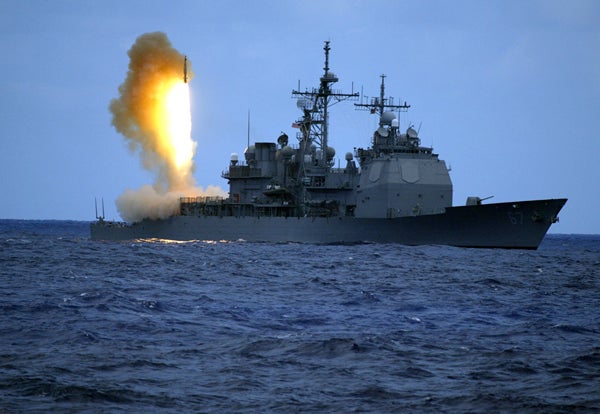In a speech delivered Tuesday at the Russian embassy in London, Russian Deputy Prime Minister Dmitry Rogozin claimed that the American missile defense shield no longer poses a threat to Russia.
This statement contradicts years of Russian officials’ objections to the presence of U.S. missiles near the Russian border, claiming they were being “pointed at” them. The claim is pure nonsense, as missile defense is a protective system, and is therefore not “pointed at” anyone.
Furthermore, with the cancellation of the SM-3 IIB program, the European missile defense system’s purpose of defending the U.S. homeland from Middle Eastern missiles has also disappeared. Although American officials have repeatedly tried to reassure the Russians on the true purpose of missile defense in Europe, Russia has continued its objections. All the confidence-building measures proposed by the U.S. to reassure them have made no difference in their rhetoric.
Now, after years of complaining about the U.S. missile shield, Rogozin, who also serves as the Russian Envoy for Missile Defense interaction with North Atlantic Treaty Organization (NATO), claims that it is not a military threat to Russia. But according to Rogozin, the U.S. missile shield provokes other nations to proliferate and still poses a political and economic problem for Russia. Rogozin has often made it clear that as a matter of policy, Russia solves its political and economic problems with the threat of military force. In addition, Russia has long claimed that having the U.S. missile shield in Europe requires Moscow to respond by continuing Russia’s buildup of its military and modernizing their nuclear forces with new weapons systems.
The Russians continue to say they must make their nation immune to U.S. missile defense capabilities now and in the future. At the same time, they also continue to say that U.S. missile defenses threaten the strategic balance between the U.S. and Russia. However, some experts argue that Russian policy is not to achieve nuclear balance with the U.S. They want Russian nuclear superiority over the U.S. to the maximum extent possible. Under this policy, any U.S. missile defense is too much, any U.S. nuclear capability is too much, and any level of Russian nuclear capability is too little.
The U.S. needs to continue to do what is necessary to provide for a common defense for its citizens and protect its allies. In a world of proliferating threats and nuclear weapons, the U.S. must have a comprehensive, layered missile defense system to achieve that national security mandate effectively.
Jordan Harms is currently a member of the Young Leaders Program at The Heritage Foundation. For more information on interning at Heritage, please click here.
